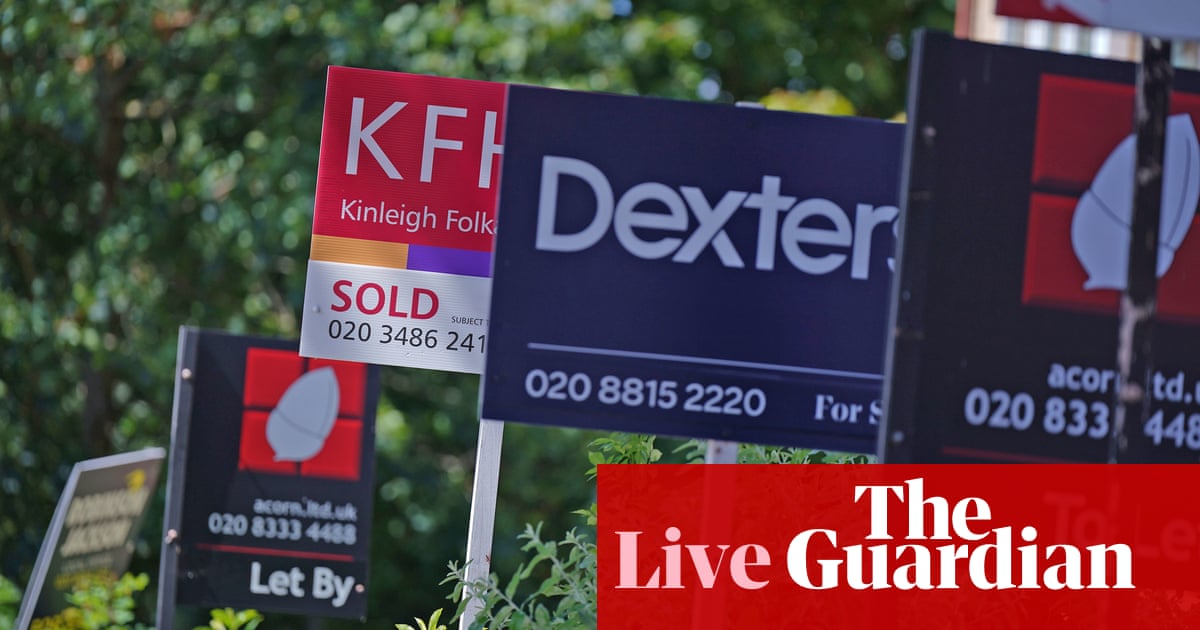Key events
Introduction: UK house prices rise in January, Novo Nordisk obesity drug sales surge – business live
Good morning, and welcome to our rolling coverage of business, the financial markets and the world economy.
House prices across the UK rose this month, as buyers took advantage of mortgage rates trending down, according to a survey.
The average price of a home increased by 0.7% to £257,656 in January, following no monthly change in December, according to Nationwide building society. Compared with January last year, prices were down just 0.2%, following an annual decline of 1.8% in December. It was the smallest annual drop in a year.
Robert Gardner, Nationwide’s chief economist, said:
There have been some encouraging signs for potential buyers recently with mortgage rates continuing to trend down. This follows a shift in view amongst investors around the future path of Bank rate, with investors becoming more optimistic that the Bank of England will lower rates in the years ahead.
These shifts are important as this led to a decline in the longer-term interest rates (swap rates) that underpin mortgage pricing around the turn of the year. However, the partial reversal in recent weeks in response to stronger than expected inflation and activity data cautions that the interest rate outlook remains highly uncertain.
While a rapid rebound in activity or house prices in 2024 appears unlikely, the outlook is looking a little more positive. The most recent RICS survey suggests the decline in new buyer enquiries has halted, while there are tentative signs of a pickup in the number of properties coming onto the market.
The Bank of England is expected to keep its base rate at 5.25% on Thursday but may lower some of its inflation forecasts, which could give it room to start cutting rates from the summer.
Denmark’s Novo Nordisk has reported strong revenue growth, with sales of its obesity and diabetes drugs soaring. Obesity drug sales alone jumped 154% at constant exchange rates to 41.6bn Danish kroner (£4.8bn) last year, fuelled by demand for Ozempic. Sales of diabetes drugs such as Wegovy and Saxenda grew by 52%. Obesity and diabetes sales together totalled 215bn kroner (nearly £25bn).
Overall sales rose 36% to 232bn kroner, while profit before tax jumped 52% to 104.7bn kroner.
The company has struggled to keep up with demand and is building more factories.
For 2024, sales growth is expected to be 18-26% at constant exchange rates, and operating profit growth is expected to be 21-29%.
Lars Fruergaard Jørgensen, president and chief executive, said:
We are very pleased with the strong performance in 2023 reflecting that more than 40 million people are now benefiting from our innovative diabetes and obesity treatments.
Our focus in 2024 will be on reaching more patients, progressing and expanding our pipeline as well as the continued significant expansion of our production capacity.
Blockbuster anti-obesity drugs such as Ozempic appear to dampen inflammation — raising hope that they could be used to treat diseases, including Alzheimer’s and Parkinson’s, that are characterised by brain inflammation, according to the journal Nature.
The Agenda
-
7.45am GMT: France inflation for January (previous: 3.7%)
-
8.55am GMT: Germany unemployment for January (forecast: 11,000)
-
1pm GMT: Germany inflation for January (forecast: 3%, previous: 3.7%)
-
7pm GMT: US Federal Reserve interest rate decision (forecast: no change)
-
7.30pm GMT: Fed press conference







